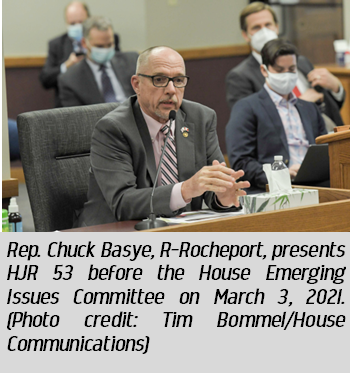|
 After hours of fierce debate that spanned the course of two days, the Missouri House on Wednesday signed off on a prohibition on transgender students participating on the sports teams that match their gender identity. The provision, offered as an amendment by Rep. Chuck Basye, R-Rocheport, to House Bill 1141 was adopted by a vote of 100 yes to 51 against, with one member voting present. Yet for the second time in two days, the underlying bill was tabled before it could be granted initial approval by the House. This time, debate stalled over an amendment that would have barred school districts from teaching curriculum on critical race theory or the 1619 Project by The New York Times, that detailed the United States’ legacy of slavery. Lawmakers in support of the measure insisted the move was not intended to discriminate against transgender youth, while those in opposition became emotional as they shared the experiences of their own transgender family members and warned the provision would cost lives. Rep. Ian Mackey, D-St. Louis, cited a 2015 study that found 40 percent of transgender people surveyed had attempted suicide. “Can we agree that people in our state deserve dignity and respect, especially under the color of law, and on a topic that is so unfamiliar to us,” Mackey said, noting there are no transgender lawmakers in the House. Basye has sponsored a version of the language as a constitutional amendment that would allow voters to decide the issue. House Joint Resolution 53 was passed out of the rules committee earlier this month, but has yet to be heard on the House floor. “I’m not a homophobe. I’m not a transphobe,” said Basye, who shared that his younger brother is gay. Basye argued it comes down to protecting the integrity of women’s sports and stressed that transgender students could still play in co-ed sports leagues. “I care about everybody. I love everybody,” Basye said. “This is not about ill feelings. This is about doing the right thing and protecting girls.” House Minority Leader Crystal Quade, D-Springfield, said she had been assured the amendment would not resurface Wednesday afternoon after the House had voted to expel a Republican member who had been accused by his adult children of sexual and physical abuse. With less than a month left in the session and after conversations with the Senate, “we all know in this body this bill is not going to become law,” Quade said. Instead, she said, the conversation was spanning the course of two days for the sake of political futures and upcoming elections. “I ask that you think about the children who are listening, the same children that we voted to protect this morning who are deeply at risk,” Quade said. Transgender youth and their family who testified against the bill last month said it was a solution in search of a problem — noting that the Missouri State High School Activities Association already has a policy in place outlining requirements for transgender youths’ participation. The association requires an approved application and transgender girls must go through one year of “documented” hormone therapy before they may participate on girls’ teams. And once granted, transgender girls must document that “the appropriate hormone levels are being maintained,” according to the policy. Rep. Shamed Dogan, R-Ballwin, said he disagrees with Basye’s amendment and asked if Basye planned to still offer the language as a constitutional amendment, which would put the question on the statewide ballot for voters to decide. “I would like to do both,” Basye said. Dogan warned of the potential economic impacts, citing the National Collegiate Athletic Association’s threat that it may move to pull championship tournaments from states that pass such bans. A wave of anti-trans legislation has been filed in statehouses nationwide this year, with similar bills restricting transgender youths’ participation recently signed into law in Arkansas, Mississippi and Tennessee. Dogan urged lawmakers to put themselves in others’ shoes, noting that for many of the lawmakers — who are straight, white males — they are in the majority. “I wonder how many of you have ever walked into a room and been the super minority among people who look like you? Certainly doesn’t happen in this chamber,” Dogan said. “Have you ever been a super minority in terms of the color of your skin, particularly in a room of powerful people? Have you ever been a super minority in terms of who you love? Have you been the only straight person in a room full of gay people? Have you ever been the only super minority in terms of how you express your gender?” At times amid the debate some Republican lawmakers alluded that allowing transgender youth to participate on teams that match their gender identity would lead to increased sexual assault or indecent exposure in locker rooms. “As a female, a God-given (gender) that was assigned to me at birth… I represent all the females in Missouri that want to compete and not be forced to be subjected to unpleasant views of male genitalia or anything like that,” said Rep. Suzie Pollock, R-Lebanon, who has sponsored a bill that would prohibit medical care for transgender youth for the purpose of gender confirmation. “Women’s rights are something that we have fought for for years and I think this is a regression on those women’s rights.” Lawmakers with transgender family members of their own urged their colleagues to consider how the legislation would affect them personally. “I will look at you. I’ll remember. This is about human rights. It’s about fair treatment. It’s simply being good policymakers. That’s all we’re asking here,” said Rep. Doug Clemens, D-St. Ann, whose brother’s child is transgender. “I get where you’re coming from. I just ask you to have an open mind and learn before jumping to writing something in the law books or changing our constitution for God’s sake.” This story has been updated since it was first published. Tessa Weinberg covers education, health care and the legislature. She previously covered the Missouri statehouse for The Kansas City Star and The Columbia Missourian, where her reporting into social media use by the governor prompted an investigation by the Attorney General’s office. She most recently covered state government in Texas for The Fort Worth Star-Telegram. www.missouriindependent.com. Comments are closed.
|
Categories
All
Archives
July 2024
|
Grain Valley NewsGrain Valley News is a free community news source published weekly online. |
Contact Us |


 RSS Feed
RSS Feed
